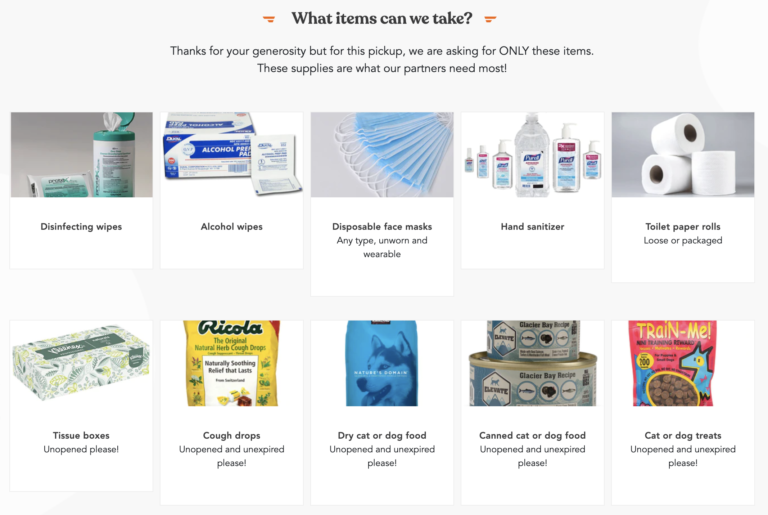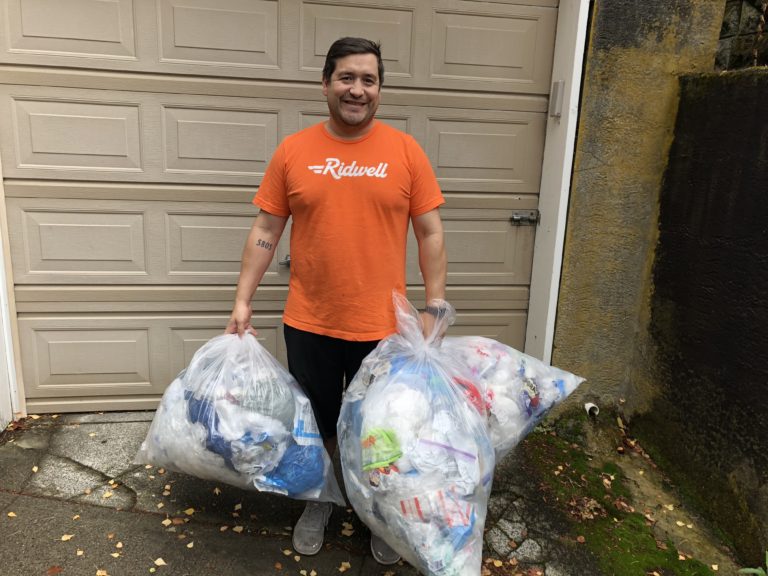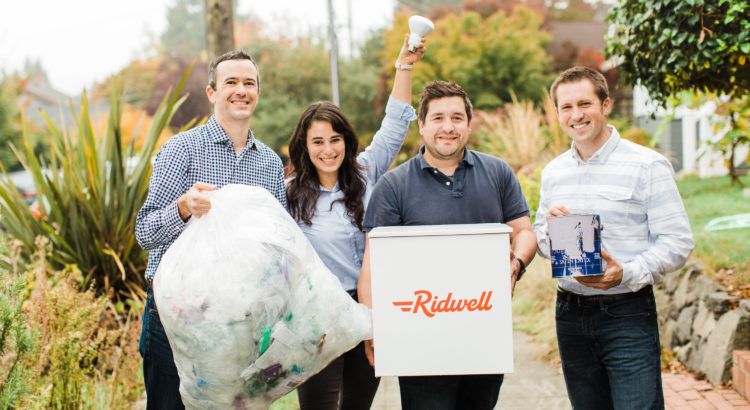Amid pandemic, MS Entre grad pivots startup to distribute critical household goods to non-profits
With a company built on the premise of helping customers do good within the community, it’s no surprise that Seattle startup Ridwell jumped into action early in the COVID-19 pandemic.
Since March, the company, which provides home pickup service of hard-to-recycle items, has been using its logistics resources and driver network to distribute donations of essential household goods to non-profits struggling to keep up with the crisis.
“Like everybody, we were thinking about what we can do to help,” says Ridwell co-founder Justin Gough (MS 2018), an alumnus of the Master of Science in Entrepreneurship Program at the UW Foster School of Business.
The team saw great need in the community and realized they were uniquely equipped to help.
When stay-at-home orders and social distancing went into effect, non-profits began reporting that the usual flow of donations suddenly stopped—just as the need was skyrocketing. At the same time, Ridwell customers were asking how they could get extra household supplies like cleaners, toilet paper, gloves, masks and food to people in need.
“We were looking at how we could tap into the people that aren’t only our members, but also the network of drivers that we have to start mobilizing the stuff that is sitting in our closet or in a cupboard and get folks that can get it to the people that need it,” Gough explains.
How to rid well
This virtuous network was inspired by a simple question posed by the young son of co-founder Ryan Metzger: how do you keep difficult-to-recycle castoffs like spent batteries out of the landfill? The answer became Ridwell.
Gough and Metzger built out a home pick-up service across the Seattle area that collects all manner of household items and finds creative ways to responsibly recycle or reuse them.
The business grew by word of mouth, from 20 members to thousands today.
“I boiled everything I learned in business school to create a business that people will pay for and tell their friends about,” says Gough, who leads the company’s operations and logistics. “That’s really the gist of Ridwell.”
Normal operations
In normal service, Ridwell picks up items from residential subscribers in four categories: plastics, clothing, batteries and lightbulbs. Styrofoam is heated and condensed into picture frames and molding. Plastic film is transformed into decking materials. Shirts and shoes are donated. Metal is reclaimed from batteries.
And with every two-week pickup cycle, the company offers a drive to collect items in a featured category that is always unique. Special pickups have found new homes or uses for art supplies, electronics, cookware, eyeglasses, latex paint, crayons and wine bottle corks. Last fall, Ridwell collected unwanted Halloween candy and distributed it to a group that provides birthday party supplies for kids experiencing homelessness. A recent drive collected bras for the non-profit Free the Girls. And a local artist turned a collection of Amazon packaging into something beautiful.

Ridwell collected a wide range of hygiene and household goods from customers to support local non-profits in the early days of the COVID-19 crisis.
Ridwell determines each featured category by listening to what customers report wanting to upcycle and then finding a way to do it. “We encourage everyone to ask us questions and tell us what they have,” Gough explains. “If 20 people tell us they have old prescription bottles, for example, we’re going to be on the hunt for a recycler or a place that can use them.”
For Gough and Ridwell, it’s about connecting the dots to figure out where there’s a need, then moving the stuff from cupboards and closets into the hands of those that need it.
“We’ve been doing that since day one,” he explains. “So the bigger question for us is not ‘Are we going to keep doing this?’ but how much more stuff can we do?’ ”
Pandemic pivot
When the COVID-19 pandemic hit Seattle hard in March, Ridwell did much more. The team immediately redeployed its network and logistical expertise to offer free additional home collection of supplies like toilet paper, gloves, sanitizer, face masks and even pet food that were in critical need at local non-profits like Mary’s Place, Pike Market Food Bank and Senior Center, and the Seattle Humane Society Pet Food Bank.
“When you have the ability to go pick it up for people who are quarantining at home, things that seem like huge task become a little bit easier,” Gough says. “This was us just understanding how we could leverage on that workflow.”
 A few weeks later, Ridwell hosted a food drive and collected more than 2,000 pounds to be distributed via Rainier Valley Food Bank and Northwest Harvest.
A few weeks later, Ridwell hosted a food drive and collected more than 2,000 pounds to be distributed via Rainier Valley Food Bank and Northwest Harvest.
“It was just amazing,” Gough says. “Northwest Harvest couldn’t believe how much stuff showed up. It was exciting that the team pulled together. Knowing that we can motivate and activate people like this is really inspiring.”
Ridwell continues to stay in touch with its non-profit partners to make sure they have everything they need. The experience in this crisis has refocused its team on new ways of making a positive impact on the Seattle community.
“This has inspired us to challenge ourselves to make an even bigger impact,” Gough says.
-Kristin Anderson


